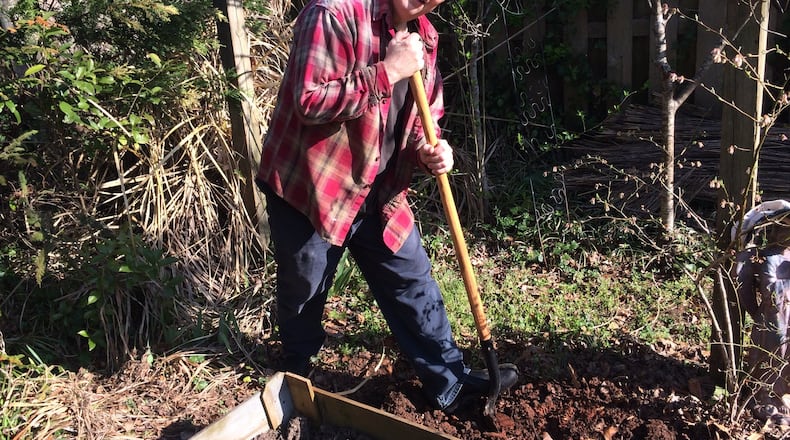EVENT PREVIEW
"Edward Foote." Through April 19. $25 and up. Alliance Theatre, 1280 Peachtree St., Atlanta. 404-733-5000; www.alliancetheatre.org/edwardfoote.
Playwright and polymath Phillip DePoy is out in his backyard, shoving a spade into the soil, turning up worms and metaphors.
In a border by the roses one can find tiny leaves of oregano, just peeking above the winter debris. Spotted nettle and lemon balm send tendrils toward the light. The Lenten rose is in full force and raised beds wait for transplanted seedlings of tomatoes and bok choy.
This sunny spring morning in Decatur could not be less like the poisonous Appalachian autumn enveloping “Edward Foote,” the Southern gothic mystery that DePoy has created for the Alliance Theatre.
And yet, there’s a parallel. It has something to do with “double digging.” After a little spadework, DePoy retires to the kitchen and his Microsoft tablet. He’s going to write a few lines and let the worms rise up in the loosened loam and leave their castings behind before he turns the ground again.
Like the garden, “Edward Foote” is double dug. DePoy, 64, unearthed the Oedipus myth and let it ferment in the Georgia mountains before putting in his shovel a second time and breaking it into pieces. The new play, premiering this weekend, is a “literary fractal” he says, an isotope of the old tragedy but with a different structure.
Critical to this story is a surprise, and rest assured I’m not going to ruin it. Unlike the Oedipus tale, “Edward Foote” keeps you guessing until the last act — practically the last line.
On the other hand, it’s got plenty in common with the Greek play, including secret identities, a swift crescendo of dread and murder and mayhem to spare.
“He’s built a menacing world there with a high degree of depth,” said director Chris Coleman before a recent rehearsal. “It’s ‘Breaking Bad,’ that kind of show …”
“… only better written,” chimed in DePoy, puckishly.
The play concerns a mysterious visitor to a tiny Appalachian village (cue snake-handling preacher) in the midst of the Depression.
It’s as bleak as the setting of the Decameron. At the same time there is a brutal beauty in the spirit-haunted hills, which shines out when the cast launches into one of the old songs from the Sacred Harp tradition.
These “shape-note” songs flourished in the rural Southeast during the 1800s, but their sound is older, almost medieval. DePoy’s brother Scott and Scott’s wife Jeannette, both members of the cast, are also leaders in the modern revival of shape-note singing.
North Georgia is the inspiration for this play, as it has been for other DePoy creations, including seven of his mystery novels. His cozy seasonal musical, “Appalachian Christmas Homecoming,” glories in another side of the hill country culture, as warm and welcoming as “Foote” is not.
DePoy began studying that culture in 1969 as a folklorist and a graduate student at Georgia State University. He traveled to the mountains to document Georgia’s vanishing music, carrying along a primitive Wollensak tape recorder and an early camcorder as big as a barbecue grill.
Since then DePoy has directed theater programs at several colleges, and sometimes he can’t resist the urge to explain.
For example, discussing “Barbara Allen,” one of the songs from the show, DePoy asks the cast at rehearsal “Does anyone here know what that melody sounded like when it came to the United States and arrived in Savannah?”
“You do,” says one cast member grimly, sensing that a lecture is imminent. DePoy laughs. Then he sings, first a melody fresh off the boat from the British Isles, a light and lilting rhapsody. Then he sings the same song, after it took root in the Georgia mountains, a dark, brooding lament.
“Between Savannah and Rabun County, that’s what happened to that melody,” he says.
The tune has long been a part of his repetoire. When the DePoy brothers were teenagers they loved Pentangle and Fairport Convention and played British folk in their ensembles, the Mystery Band and Lazarus, with Scott on violin and Phillip on guitar. Later they formed a jazz band called Nick’s Flamingo Grill and switched to swing music from the 1920s and ’30s.
They come from a musical family. Their mother sang on the radio when she was a grade-schooler, and their father moved the family to Georgia from Illinois to play French horn with the Atlanta Symphony Orchestra.
Music and theater guided DePoy’s early career. He was composer in residence for the Academy Theatre, and was artistic director of the Theatrical Outfit during the 1990s. But he is also a prolific novelist and playwright.
He has written 14 novels, written and/or scored 30 plays, published 50 poems and still has time to raise vegetables and cook tasty meals. Currently he’s writing three projects: a novel about 16th century playwright (and alleged spy) Christopher Marlowe, a science fiction novel called “Ancient” and “a play that I can’t talk about.”
Working on multiple projects at once is pure DePoy, said his wife, actress and playwright Lee Nowell. “He might be the most disciplined person I’ve ever known,” said Nowell, who is currently rewriting her play about the execution of Troy Davis.
“You’d have to see the sheer amount of work he puts in every day to be able to understand that,” she said. “He routinely works on three and four projects at the same time.”
DePoy follows the Larry McMurtry school of writing discipline, which is: Get up early, crank out your pages, quit when you’re done. He doesn’t believe in writer’s block and can’t understand the writers who say they hate to write.
“The other rewards aren’t enough!” he says. “Why would you do it if you didn’t like it? It’s like being in a band. When you stop loving it, you stop doing it.”
About the Author
The Latest
Featured



